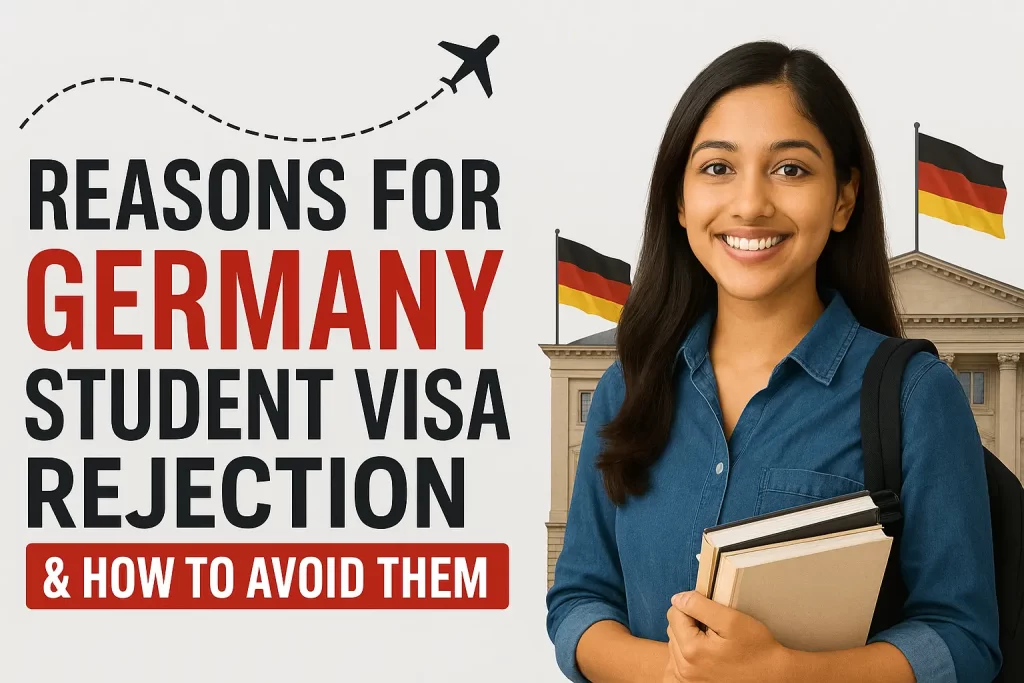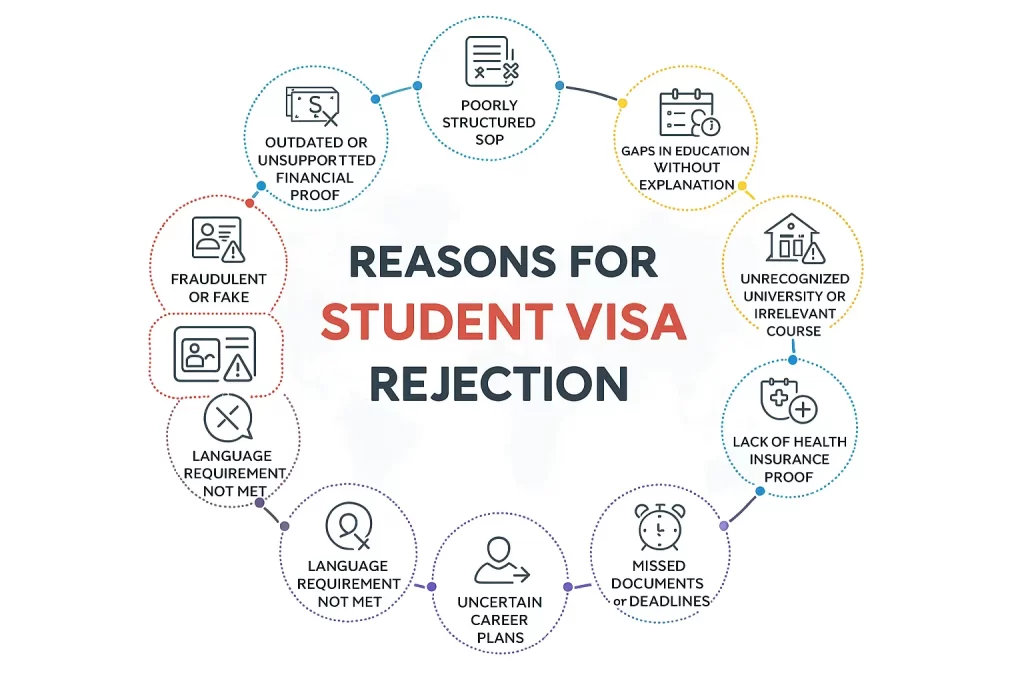1. Outdated or Unsupported Financial Proof.
This is one of the biggest reasons why students get rejected for the Germany student visa — many students unknowingly mess up their financial documentation by submitting old bank statements, using accounts that don’t belong to them, or relying on sponsors without proper paperwork.
The German embassy is very strict when it comes to finances. If your documents aren’t clear, complete, and verifiable, your application could face visa rejections — no second chances. There must also be clear evidence that you can afford to support yourself while you study in Germany.
❌ Common Mistakes Students Make:
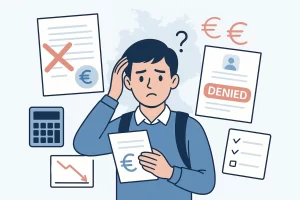
- Submitting outdated or incomplete bank statements.
- Not opening the blocked account on time.
- Using unverified sponsors without proper legal documents.Showing funds that don’t meet the required minimum or are unclear in origin.
🛡️ How to Avoid This:
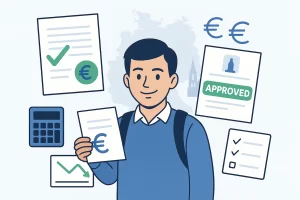
- Use a government-approved blocked account (like Fintiba, Expatrio, or Coracle).
- Ensure the account is fully funded (€11,208 as of now) and activated before your visa interview.
- If using a sponsor, include a notarized affidavit and income proof.
- Avoid sudden large deposits unless you can clearly explain them.
- Use recent bank statements (issued within the last 4 weeks) and get them stamped or certified.
- Include a summary letter explaining your funding source if multiple accounts are used.
Pro Tip: The embassy won’t ask you to fix errors — they’ll just reject your file. Get your financial documents reviewed in advance to be absolutely sure.
👉 Need help preparing embassy-ready financial proof?
Have a consultation with Amratpal A Vision and save yourself from costly rejection.
2. Poorly-structured or non-relevant SOP (Statement of Purpose).
Your SOP is one of the most important parts of your Germany student visa application — yet it’s also the most underestimated. It’s not the format that matters — it’s the story of where you’re going, and how clearly you can express your goals and motivation. It’s your chance to show why you chose this course, why this university fits, and what you plan to do after your studies.
But here’s the problem: most students either copy SOPs from the internet, use vague and robotic language, or completely skip over key points like “Why Germany?” and their future goals. A generic SOP tells the visa officer nothing about you — and that’s a red flag.
❌ Common Mistakes Students Make:

- Reusing someone else’s statement (SOP) without adding your own story.
- Submitting without a clear purpose or missing personal motivation.
- Not explaining why this course or country matters to you.
- Using poor grammar, long, confusing sentences, or bad formatting.
🛡️How to Avoid Rejection:

- Ensure that the SOP is in line with your background, interests, and career plans.
- Clearly explain why this course and studying in Germany make sense for you
- Mention your short-term and long-term goals clearly
- Keep it honest, specific, and structured.
- A well-written SOP doesn’t just help you tell your story — it increases your chances of approval.
3. Gaps in Education Without Proper Explanation.
Many genuine students are rejected because they didn’t explain their study gaps properly in their application.
Even genuine reasons like preparing for exams, family responsibilities, or personal challenges must be clearly stated and backed with proof. If your academic history has gaps — say, between 12th grade and Bachelor’s, or post-graduation — you need to justify them with clarity. Unexplained gaps raise red flags.
❌Common Mistakes Students Make:
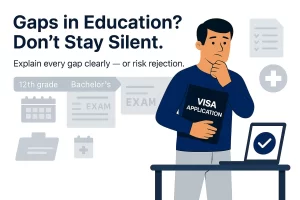
- Ignoring or skipping explanations for long study gaps.
- Assuming the gap isn’t important enough to mention.
- Not providing any supporting documents or certificates.
- Giving vague or unclear reasons in the SOP.
- Making vague statements about “personal reasons,” without giving context.
🛡️How to Avoid Rejection:
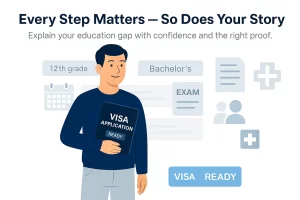
- Include internship/work experience certificates, online course certificates, or a written explanation.
- Do not leave any gaps in the SOP, as well as in your cover letter.
👉 Not sure how to explain your gap? Let Amratpal A Vision help you craft a strong, honest SOP that works.
4. Low Grades or Degree Mismatch
Not every rejection happens because of paperwork — sometimes it’s about your academic profile. If your previous grades are low or your degree doesn’t align with the course you’re applying for, it can raise doubts about your eligibility or seriousness.
Visa officers want to see a clear connection between your past studies and the program you’ve chosen to study in Germany. If that link is missing, your application may lead to visa rejections.
❌Common Mistakes Students Make
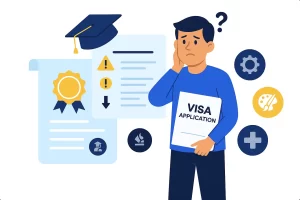
- Applying to advanced technical programs with unrelated backgrounds.
- Ignoring minimum grade or credit (ECTS) requirements.
- Not checking if your degree is recognized in Germany.
- No explanation in SOP for a shift in academic focus.
🛡️How to Avoid Rejection:

- Choose courses that align with your previous education or work experience
- Justify any shift in your field with a strong SOP
- Use the Anabin database to check if your degree is recognised.
- Apply to universities that match your profile realistically
👉 Unsure if your academics match your course? Talk to the experts at Amratpal A Vision and find the right pathway.
5. Unrecognized Universities or Irrelevant Courses.
Getting an offer letter isn’t enough — not all universities or courses in Germany are recognized by the embassy. If you apply to an unaccredited private university or pick a course that doesn’t match your background, your visa could get rejected even with admission in hand.
Visa officers check if the university is state-approved and whether the course makes sense for your profile. If either is off, your intent may be questioned.
❌Common Mistakes Students Make:

- Applying to universities that are not state-accredited.
- Choosing courses that don’t match your past studies or career path.
- Prioritizing quick admission over academic credibility.
- Not checking course accreditation or university status on official portals.
🛡️How to Avoid Rejection:
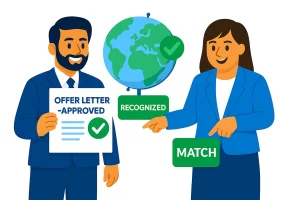
- Always verify whether the university is accredited by the German government.
- Select programs consistent with your academic or work background.
- Avoid short-cut consultancies that offer fast but risky admissions.
- Check the Anabin database or ask reliable consultants before applying.
👉Want to be sure your university and course are 100% valid? With Amratpal A Vision by your side, you’ll find the right path and avoid unnecessary mistakes.
6. Lack of Health Insurance Proof.
Health insurance isn’t optional — it’s a mandatory requirement for your student visa in Germany. Yet, many students either submit the wrong type of insurance or forget to include it altogether. If you don’t have valid health coverage starting from your arrival in Germany, your visa could be denied for technical reasons.
All residents in Germany need to get health insurance, and that includes international students. And if you’re applying for a student visa, you must show valid health insurance coverage before entering the country. If you skip this, it may lead to an instant visa rejection.
Many students aren’t aware that they need private health insurance first, before they can switch to public insurance. That’s because most public providers in Germany only allow registration after you’ve officially enrolled in your university. But here’s the catch: to get a visa and study in Germany, you already need proof of insurance.
❌Common Mistakes Students Make:
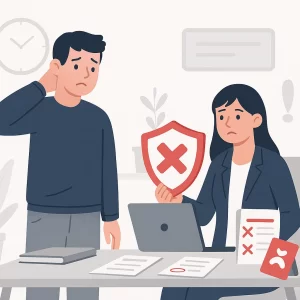
- Submitting travel insurance instead of approved student health insurance.
- Assuming public insurance is enough without knowing enrollment is required first.
- The health insurance certificate is not being attached to the visa application.
- Choosing a policy that starts after their arrival in Germany.
- Confusing private- and public-insurance choices.
- Leaving insurance arrangements until the very end of the application timeline.
- Picking a non-embassy-approved insurance provider.
🛡️How to Avoid Rejection:

- Arrange your private health insurance in Germany before applying for your student visa — it’s required for visa approval.
- Make sure your policy is embassy-approved and starts from your date of arrival in Germany.
- Once you’re officially enrolled at your university, you can switch to public health insurance if you’re eligible.
- Always attach your insurance confirmation letter to your visa application.
- Choose a trusted provider that offers international student health insurance accepted by German authorities.
- If you’re unsure, get guidance from experts who understand health insurance in Germany for international students.
👉Need help picking the right plan? Amratpal A Vision will guide you step by step — from choosing the provider to getting visa-ready documents.
7. Missed Documents or Deadlines – Small Mistake, Big Consequence.
It might seem like a minor oversight, but missing even one required document or missing your visa appointment deadline can cost you your entire application. German embassies are strict — they won’t wait or follow up for missing papers. If something’s not included or submitted late, your file couldface visa rejections without warning, putting your plans to study in Germany at risk.
❌Common Mistakes Students Make:
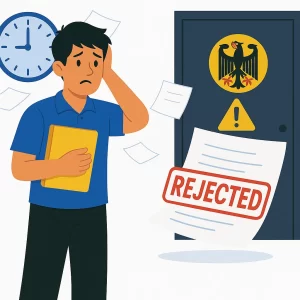
- Forgetting to upload or print essential documents.
- Not booking the visa appointment early enough.
- Submitting an incomplete application form.
- Waiting until the last week to gather everything.
- Missing university or embassy submission deadlines.
🛡️How to Avoid Rejection:
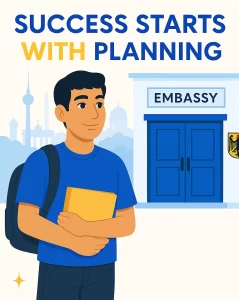
- Use a detailed checklist and double-check everything
- Submit your documents well before the deadline
- Stay organized and don’t rely on last-minute prep
- Get your documents double-checked by a reliable expert.
👉Need help organizing your documents and timeline? Amratpal A Vision has helped 1000+ students submit perfect files — yours could be next.
8. Uncertain Career Plans: Officers Must Believe in Your Intentions.
If it’s not clear to visa officers what you want to do after your studies, they may suspect your true motivation for wanting to study in Germany. Statements like “I’ll figure it out later” or vague replies in your SOP diminish the strength of your profile. They want to know that you have a legitimate, deliberate path — not just a “go abroad” plan. Lack of clarity can often lead to visa rejections.
❌Common Mistakes Students Make:

- Leaving out post-study plans in your SOP.
- Responding in an ambiguous or contradictory manner.
- Selecting a course not related to where you are headed in the future.
- Not articulating how the course applies to your future career.
🛡️How to Avoid Rejection:

- Share with us your short-term and long-term career objectives.
- Explain how this course supports your future.
- Research and list a variety of job opportunities, industries, or further education options.
- Keep your story consistent.
👉Not sure how to present your goals? Amratpal A Vision will guide you to construct a meaningful, purpose-driven application that earns trust and confidence.
9. Failure to fulfill the language requirement.
You may satisfy all other criteria, but if you can’t prove language proficiency, your visa could be rejected out of hand. Whether your program is taught in English or German, embassies want to see definite proof that you would be able to learn and succeed in your course to study in Germany.
A lot of students believe either that they’ll be able to turn in results later or that they can simply say they’ll learn when they get there — neither of which is the case.
❌Common Mistakes Students Make:
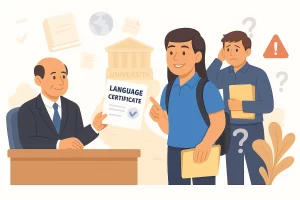
- Do not provide your IELTS/TOEFL scores for English programmes.
- Application for German degree courses without A1-B2 language certificate.
- Using an out-of-date or unauthorized language certificate.
- Not knowing about the language requirement prerequisite before applying for the course.
🛡️How to Avoid Rejection:
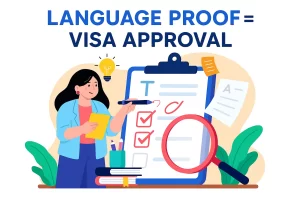
- Please also attach valid language certificates (IELTS, TOEFL, Goethe, Telc etc.)
- Find out the precise language requirements for your course and institution.
- Finish your exam process as soon as possible to update your visa file with the score.
- If you’re learning German, mention your current level and planned progress in your SOP.
👉Need help with language preparation or choosing the right test? Amratpal A Vision guides you step-by-step — from selecting the course to passing your language exam with confidence.
10. Fraudulent and Questionable Documents.
The surest way for your visa to be denied (and possibly even for you to be banned from reapplying) is to submit forged, doctored or inconsistent documents. German embassies double-check every piece of information, and even the tiniest discrepancy can call your credibility into question.
And remember, it doesn’t matter if you have documents or not — you need the right documents, in the right format, from the right official sources.
❌Common Mistakes Students Make:
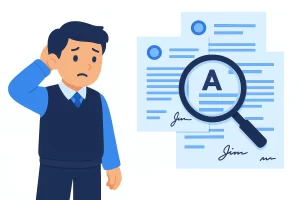
- Modifying bank letters or certificates.
- Submitting documents where the information (names, dates and misspellings) doesn’t add up.
- The use of unofficial intermediaries or unofficial sources for documentation.
- Notarizing or translating documents of importance wrong.
🛡️How to Avoid Rejection:
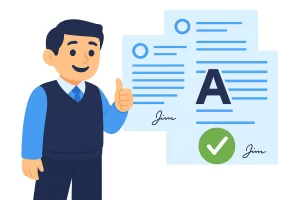
- Use only real, authenticate source documents that can be verified through official channels.
- Double-check for consistency in all personal information throughout the forms.
- Ensure translations and notarizations are completed by professionals.
- Don’t take shortcuts — a little lie can snowball into a major setback.
Not sure if your documents are embassy-ready?
👉Let Amratpal A Vision review your file and make sure everything is 100% accurate and secure.
CONCLUSION
Your Way to a Successful Germany Student Visa Is Right Here.
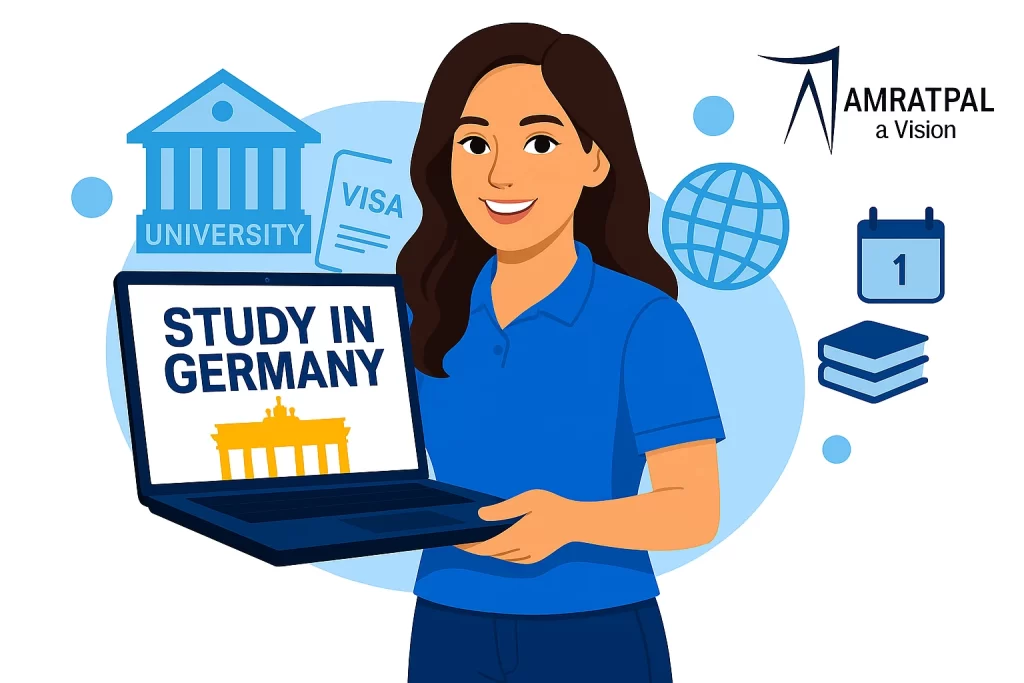
Getting into a German university is a great accomplishment – but securing your student visa is what actually brings your dream to life. As you’ve learned, most visa rejections don’t happen because students aren’t capable — they happen due to simple, avoidable mistakes: outdated paperwork, unclear SOPs, missing insurance, or weak financial proof. It’s all about the details — and the embassy doesn’t offer second chances.
The good news? With expert help, you can prevent all of these problems.
Stay organized. Be honest in your documents. Choose a course that fits your background. Start your prep early. These small steps can make a huge difference in your chances of getting approved.
Still feeling anxious or unsure?
Amratpal A Vision has helped thousands of students craft strong, clear, and trusted visa applications that get results. From reviewing your SOP and financials to helping you pick the right course and gather the correct documents, their expert team ensures everything is done right and ready for the embassy.

